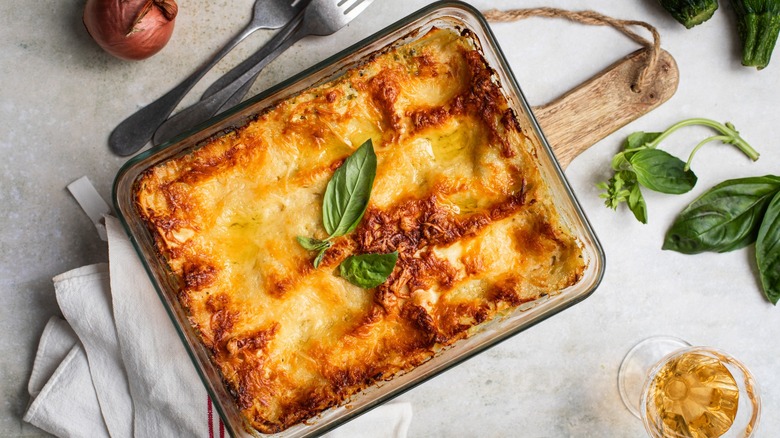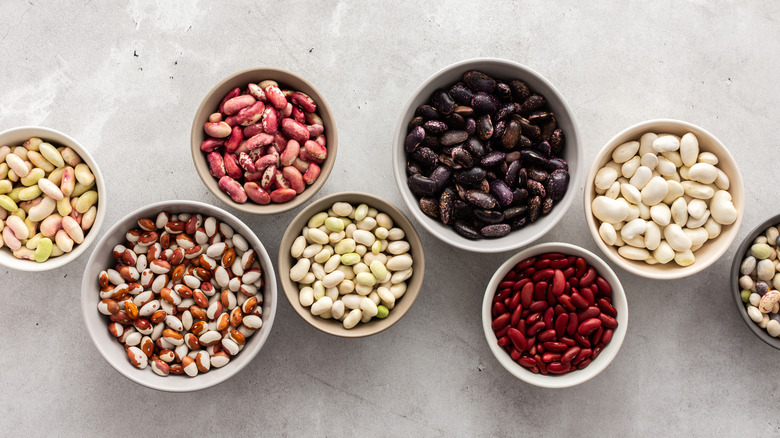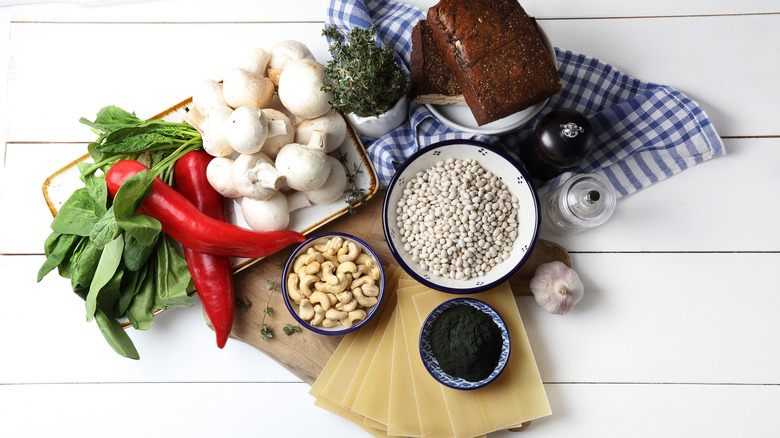It's Time You Start Beefing Up Your Lasagna With Beans
The whole party seems to come alive anytime lasagna hits the dining table. When you've got layers upon layers of cheese and meat (or veggies) smothered in tomato sauce, every forkful is pure joy. It only gets better when other ingredients join in, elevating the dish with new textures and flavors. Don't limit yourself to the same few choices, however. Think outside the box a little and throw some beans into the baking tray next time you're cooking up lasagna. The result might surprise you in the best way possible.
For something that's typically tangy and hearty like classic lasagna, beans make quite an outstanding addition. After all, there's nothing else in the dish that offers the same earthy, nutty tone as they do. Still, they manage to do both things at once: Diversify the taste profile and blend in perfectly with the rest of the tumultuous flavors. Popping up between each cheesy bite, they're just the subtle twist needed to keep the familiar dish interesting.
Accompanying this flavor wonder is a satisfying textural impact. While the pasta and cheese provide that signature tenderness, the beans add a starchy touch that bulks up the dish. Freshly hot from the oven, these different textures melt seamlessly into one another and then unravel like a dream on your taste buds.
What type of beans to use for your lasagna?
You've got quite a few choices when it comes to beans, and it mostly comes down to personal preference. If you're not sure where to start, black beans are always foolproof. They're just flavorful enough to complement the lasagna's richness and impact a subtly nutty undertone without outshining the remaining ingredients.
White beans, whether we're talking cannellini beans, navy beans, or great northern beans, are all fantastic for those who like it mild. Lightly nutty with a soft, creamy texture, they absorb other flavors like a champ. This helps to balance out some of the bolder notes and keeps the dish from overwhelming the palate.
Sweetness is yet another possibility, and you'd only need red kidney beans to accomplish that. With relatively firm skin, they hold up well during the baking process, but the inside is still soft and mushy enough to soak up all the flavors when needed. There are two main varieties to choose from: Dark red and light red. Go with the first one for more pronounced taste and firmness, and of course, stick to the latter if you want less intensity.
What else goes into a lasagna loaded with beans?
Once you've got the beans, there's no need to stop there. Have fun to your heart's content for a one-of-a-kind lasagna bursting with different flavors and textures. Consider introducing another sauce to diversify the dish even further. You could introduce some pesto for an herbaceous depth to harmonize with the earthy beans, or forego the usual marinara and take on the creaminess of Alfredo sauce. If you're using pinto beans, how about whipping up a Mexican-style lasagna with salsa for a sauce? Or perhaps make a bean béchamel sauce for a different but no less phenomenal way to enjoy lasagna.
Since the beans are already a decent source of protein, you can go meatless with the lasagna if you want to. They're hearty and filling enough to stand in for meat but feel free to keep them company with mushrooms, tofu, or any vegetable of choice for a more substantial dish. In fact, you can even make a green lasagna loaded with white beans, leafy greens, herbs, and lasagna pasta, all coated in a delectable green sauce.
Don't forget you can also mix different bean varieties together. Although the nuances are only slightly different, they still make for an exciting experience. A three-bean lasagna doesn't sound like such a bad idea, after all. Even other legumes could also join the party. Lentil, for example, is sure to fit right in with its distinctive nutty tone. Whichever route you take, know that you can add some nutritious textural contrast to your next home-baked lasagna.


